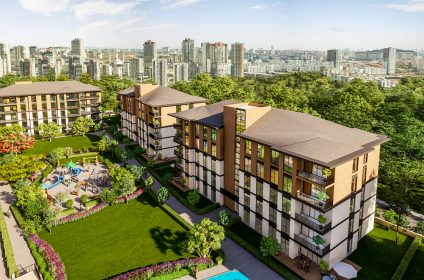Factors Influencing Costs and Tips for Getting the Best Deals
Turkey's real estate market is diverse and dynamic, offering many properties, from luxurious villas on the Mediterranean coast to affordable apartments in bustling urban centers.
The country's strategic location, vibrant economy, and rich cultural heritage make it an attractive destination for domestic and international buyers. However, house prices in Turkey can vary significantly based on several factors.
This article explores what controls house prices in Turkey, why some areas are more expensive than others, and offers tips for getting the perfect price.
Factors Influencing House Prices in Turkey

1. Location
Urban vs. Rural Areas: House prices in Turkey are heavily influenced by location. Properties in major cities like Istanbul, Ankara, and Izmir tend to be more expensive than those in rural areas. Urban centers offer better access to amenities, employment opportunities, and cultural attractions, increasing demand and prices.
Proximity to the Coast: Coastal areas, especially along the Aegean and Mediterranean seas, command higher prices due to their scenic beauty, favorable climate, and tourism appeal. Popular destinations like Bodrum, Antalya, and Fethiye attract domestic and foreign buyers, pushing up property values.
Neighborhood Quality: Within cities, the quality of the neighborhood significantly impacts house prices. Areas with good schools, parks, shopping centers, and low crime rates are more desirable and thus more expensive. Historical and trendy districts like Beyoglu in Istanbul also see higher property values.
2. Economic Factors
Economic Growth: Turkey's economic performance directly affects the real estate market. Periods of economic growth lead to increased disposable income and higher demand for housing, driving up prices. Conversely, economic downturns can result in lower demand and stagnating or declining prices.
Inflation and Interest Rates: High inflation rates can increase house prices as construction costs increase. Conversely, low interest rates make mortgages more affordable, boosting demand and prices. The Central Bank of Turkey's monetary policies shape these economic conditions.
3. Foreign Investment
Attractiveness to Foreign Buyers: Turkey's real estate market is famous among foreign buyers, particularly from the Middle East, Europe, and Russia. Foreign investment laws that facilitate property ownership by non-residents, combined with the appeal of Turkey’s lifestyle and relatively affordable prices compared to Western Europe, drive demand and elevate house prices.
Citizenship by Investment Program: Turkey's Citizenship by Investment Program, which grants citizenship to foreigners who invest a certain amount in real estate, has also contributed to increased demand and higher property prices, especially in critical areas like Istanbul and the coastal regions.
4. Infrastructure and Development
Transport Links: Proximity to primary transport links such as highways, airports, and public transportation significantly influences house prices. Properties near well-developed infrastructure are more desirable due to the ease of commuting and accessibility.
Urban Development Projects: Government and private sector investment in urban development projects, such as new residential complexes, shopping centers, and business districts, can boost property values in the surrounding areas. For instance, the development of Istanbul's new airport has positively impacted nearby real estate prices.
5. Property Characteristics
Property Type and Size: The type (apartment, villa, townhouse) and size of the property are crucial in determining price. More significant properties and those with additional features like private gardens, pools, and security services generally command higher prices.
Age and Condition: Newer properties with modern amenities and energy-efficient designs are more expensive than older buildings. However, well-maintained historical properties in prime locations can also be precious.
Why Some Areas Are More Expensive Than Others

1. Istanbul
Istanbul is Turkey's largest city and its economic and cultural hub. It is divided into numerous districts, each with varying property prices. Areas such as Bebek, Nisantasi, and Etiler are among the most expensive due to their central location, high-quality amenities, and affluent residents. In contrast, districts further from the city center, like Esenyurt and Beylikdüzü, offer more affordable housing options.
2. Coastal Cities
Cities along Turkey's Aegean and Mediterranean coasts, like Bodrum, Antalya, and Alanya, are known for their beautiful landscapes and tourism appeal. These areas attract holiday home buyers and retirees, driving up property prices. Coastal properties with sea views or beach access are costly.
3. Ankara and Izmir
Ankara, Turkey's capital, and Izmir, a major port city, also have higher property prices in central and affluent neighborhoods. Areas like Cankaya in Ankara and Alsancak in Izmir are highly sought after for their prime locations and quality of life, leading to higher real estate values.
4. Emerging Areas
Some regions in Turkey are experiencing rapid development and increased property values due to new infrastructure projects and urbanization. For example, areas around Istanbul's new airport and the planned Canal Istanbul project are seeing rising property prices as they become more accessible and desirable.
Tips for Getting the Perfect Price

1. Conduct Thorough Research
Before purchasing, research the local real estate market to understand average property prices and trends. Use online real estate portals, consult local agents, and visit multiple properties for a comprehensive market view.
2. Choose the Right Location
Consider your needs and preferences when selecting a location. If you prioritize convenience and access to amenities, focus on urban areas. Look at coastal or rural regions for a quieter lifestyle or holiday home. Ensure the location has good potential for future value appreciation.
3. Negotiate the Price
Don’t be afraid to negotiate the price with the seller or developer—research comparable properties in the area to support your negotiation. Being flexible with your move-in date or payment terms can also give you leverage in securing a better deal.
4. Work with a Reputable Real Estate Agent
Engaging a reputable real estate agent with local expertise can significantly enhance your property search and negotiation process. An experienced agent can provide valuable insights, arrange property viewings, and assist with the legal and financial aspects of the transaction.
5. Consider Off-Plan Properties
Investing in off-plan properties (still under construction) can offer significant cost savings compared to completed units. Developers often offer attractive payment plans and discounts for early buyers. However, ensure you research the developer’s reputation and the project’s feasibility before committing.
6. Evaluate the Property’s Condition
Thoroughly inspect the property to identify potential issues that could affect its value or require costly repairs. Hiring a professional property inspector can provide an unbiased assessment of the property’s condition.
7. Factor in Additional Costs
When budgeting for your purchase, consider additional costs such as taxes, legal fees, maintenance fees, and potential renovation expenses. Being aware of these costs upfront can prevent unexpected financial burdens later.
8. Consider Future Developments
Research any planned infrastructure projects or urban developments in the area that could enhance property values in the future. Investing in a property near upcoming transport links, commercial centers, or recreational facilities can offer long-term value appreciation.
9. Monitor Market Trends
Monitor market trends and economic indicators that could impact property prices. Understanding the broader economic context can help you make informed decisions about the timing of your purchase.
10. Legal and Financial Due Diligence
Ensure all legal and financial aspects of the transaction are handled meticulously. Verify the title deed, ensure no outstanding debts on the property, and consult a lawyer to review the sales contract. Secure financing options if needed and ensure a smooth transfer of ownership.
Conclusion
Turkey's real estate market offers diverse opportunities for buyers, with house prices influenced by location, economic conditions, foreign investment, and property characteristics. Understanding these factors can help you navigate the market and find the perfect property at the right price. Whether you're looking for a luxurious villa on the coast, a modern apartment in the city, or an affordable home in an emerging area, thorough research, strategic planning, and professional guidance can ensure a successful and rewarding property purchase in Turkey.
Read Also:
Invest in Short-Term Rentals apartments in Turkiye
How to Evaluate a Neighborhood: 10 Key Factors for Real Estate Buyers


